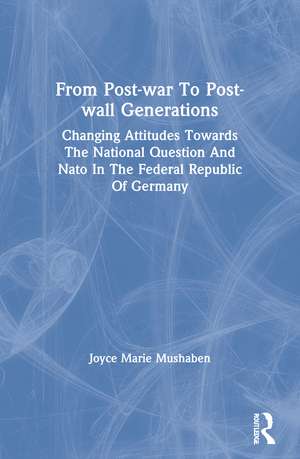From Post-war To Post-wall Generations: Changing Attitudes Towards The National Question And Nato In The Federal Republic Of Germany
Autor Joyce Marie Mushabenen Limba Engleză Paperback – 19 oct 2020
| Toate formatele și edițiile | Preț | Express |
|---|---|---|
| Paperback (1) | 404.21 lei 6-8 săpt. | |
| Taylor & Francis – 19 oct 2020 | 404.21 lei 6-8 săpt. | |
| Hardback (1) | 763.97 lei 6-8 săpt. | |
| Taylor & Francis – 18 apr 2019 | 763.97 lei 6-8 săpt. |
Preț: 404.21 lei
Nou
Puncte Express: 606
Preț estimativ în valută:
77.34€ • 80.75$ • 64.01£
77.34€ • 80.75$ • 64.01£
Carte tipărită la comandă
Livrare economică 04-18 aprilie
Preluare comenzi: 021 569.72.76
Specificații
ISBN-13: 9780367153854
ISBN-10: 0367153858
Pagini: 434
Dimensiuni: 152 x 229 x 30 mm
Greutate: 0.8 kg
Ediția:1
Editura: Taylor & Francis
Colecția Routledge
Locul publicării:Oxford, United Kingdom
ISBN-10: 0367153858
Pagini: 434
Dimensiuni: 152 x 229 x 30 mm
Greutate: 0.8 kg
Ediția:1
Editura: Taylor & Francis
Colecția Routledge
Locul publicării:Oxford, United Kingdom
Cuprins
0. Introduction: The Evolution of National-Security Consciousness in the Postwar German Federal Republic 1. The Problem of Generations: Identity-Formation and the New "Unencumberedness" 2. What Does it Mean to Be German? from Beethoven to Bitburg, From Demagogues to Democrats 3. Perceptions of the Other Germany: "Renunification Maybe, But I'd Hate to Take My Vacation There" 4. Partnership and its Discontents: Assessing the Federal Republic's Role in NATO 5. Successor Generations and Security Doctrine: "Deterrence, Yes, But Not in My Backyard" 6. Generational Differences and the Gender Gap: Identity and Security Consciousness Among West German Women 7. What it Means to Be Non-German: After Unity, the Deluge 8. Conclusion: From Two States in One Nation to One Volk in Two Cultures
Descriere
This book is a study of four separate-but-related German Questions, as perceived, interpreted and answered by members of the postwar generations who constitute a majority of the citizens in the 'old states' of the now united Bundesre publik.
